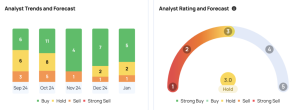If you’re looking at dividend stocks as a source of income, obviously quality matters. But timing can play a role in how much income these investments generate for you, too. The lower these stocks are priced, the more shares you can buy, and the higher your effective yield is.
In other words, you get more bang for your buck when you buy dividend stocks while they are trading at a discount.
With that as the backdrop, here’s a closer look at three of the S&P 500‘s top dividend payers that are currently on sale. Any or all of them would be solid additions to most income investors’ portfolios.
Thirty years ago, major pharmaceutical names like Merck (NYSE: MRK) were titans. New science had laid the groundwork for a golden era, giving all the big names in the business at least one blockbuster drug, plus at least one or two prospective blockbusters in each company’s pipeline. For Merck, these leading products were Singulair, Januvia, and Vioxx.
The industry has changed since then, however. It’s more crowded, and as such, it’s more competitive. That’s why these companies don’t grow their top lines as rapidly as they used to. Merck is no exception to this dynamic either. That’s why its stock has generally underperformed the S&P 500 for the past 20 years.
Just don’t lose perspective.
While the business’s glory days may be in the rearview mirror, what this company lacks in growth firepower it more than makes up for in reliable income that in turn supports a dividend that’s grown every year for the past 14 years. Merck is simply leveraging its sheer size to either develop new drugs or acquire them. For instance, its current top-selling cancer drug, Keytruda, was actually the prize from 2009’s acquisition of Schering-Plough. And, now that the end of Keytruda’s smashing commercial success is at least in sight, it’s paying China’s biotech LaNova Medicines for the right to its developmental cancer therapy currently in phase 1 trials.
This is the new norm within the world of medicine, and Merck navigates it nicely even if not explosively. Better still, with the stock now down 25% from June’s peak, newcomers will be stepping in at a forward-looking dividend yield of nearly 3.3%.
There’s no denying Nike‘s (NYSE: NKE) fall from grace.
The athletic apparel brand’s stock was flying high into and then even through the heart of the COVID-19 pandemic, driven higher by consumers’ affinity for its goods (and its sneakers in particular). Then it all came unraveled. Thanks to a combination of supply and distribution snafus, evolving consumer preferences, economic lethargy, and a lack of perceived innovation, in 2022 Nike’s business hit a wall. Ditto for the stock, which is now down roughly 60% from its late-2021 peak and still knocking on the door of lower lows.


